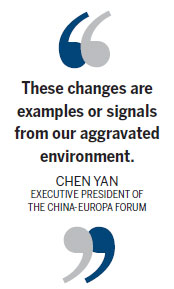China-Europe forum targets weather changes
Updated: 2014-11-28 08:28
By Tuo Yannan(China Daily Europe)
|
|||||||||||
Meeting to address environmental dangers from a society-to-society point of view
Climate change is an opportunity as well as a challenge, and the societies of China and Europe should join to help solve the problem, says Chen Yan, executive president of the China-Europa Forum.
Climate change is a highlight topic this year for the China-Europa Forum, a society-to-society dialog whose next meeting is scheduled for Dec 2-5 in Paris. The focus of the meeting will be to take a deeper look at the damage caused by human activities, come to terms with its importance and create a common statement for delivery at the United Nations Climate Change Conference to be held in Paris late next year.
More than 300 Chinese and European climate change experts at the China-Europa Forum are expected to discuss how to battle climate change. Those attending will include businesspeople, academics and representatives of NGOs.
"Negotiations among governments are frequent, but at the business level, at the private sector level and at the people-to-people level, communication on this issue is not as smooth as it is at the country level," Chen says. The forum, therefore, is meant to build a platform for dialog between European and Chinese societies.
The importance of climate change needs to be given wider attention, he says.

"Some experts have even said the 2015 climate change conference will be the last chance to save the human species. Although this point of view is a little bit extreme, I will say it is partially right."
The 2015 conference is very important, he says, because if there is no agreement again next year, worsening climate changes will cause severe effects on human health and economic growth.
The importance of climate change is much more widely accepted by society than before, Chen says.
"A few years ago, many experts and scientists had doubts about whether human activities could be blamed for global warming. However, those doubts are rarely heard now. This means people are forming a common view on this issue."
The United Nations Intergovernmental Panel on Climate Change concluded recently after a review of 30,000 studies that there is a 95 percent certainty that most of the warming seen since the 1950s is caused by humans, he says.
But climate change also brings opportunities to society in terms of ideology and economic growth, he says. "Now is not a time to argue about what caused the climate change phenomenon. It is the time for all of us to rethink our previous ideology regarding the relationship between nature and science."
According to Chen, we should stop thinking that science is omnipotent and can conquer nature. "Humans depend on nature. There is no way to turn back the clock once the climate gets too warm."
He believes there are two key perspectives in dealing with climate change. The first is the often-discussed need to reduce carbon emissions to keep global warming below an average of 2 C beyond pre-industrial levels. That is a threshold scientists warn could trigger dangerous effects, including a major sea-level rise.
The second perspective has not been discussed as much as the need to adapt to climate change.
Chen cites a lawsuit in France as an example. This year a suit was filed in a small town in the Bordeaux region of France. Residents sued the local mayor because in 2010 storms packing hurricane-force winds swept across Western Europe, killing some 50 people in France. Of those killed in France, 29 died in the town of 700, Chen says. Residents blamed the mayor for issuing too many permits for housing construction in unsafe areas.
"The main reason so many people died is because we are not well-prepared for aggravated disasters caused by climate change," Chen says. "Global warming causes the sea level to rise and hurricanes and storms are more fierce than before, but we are not ready to adapt to these changes."
There also have been warning signs in China, Chen says. Since 2009, the country has changed greatly, with unusually heavy snowfall in some areas and air quality problems. "These changes are examples or signals from our aggravated environment, and also warnings for us that we can't delay on environment issues."
Fortunately, China has taken note of these changes, and public awareness of the need to protect the environment has increased, he says. "This change of awareness will work in China's favor in the battle against climate change, and it also provides the opportunity to change our industrial development into a sustainable and clean mode.
"The earlier we realize the problem, the smaller our losses will be. In the short term we may sacrifice some economic growth, but we are avoiding bigger future losses in the long term," he says.
tuoyannan@chinadaily.com.cn
(China Daily European Weekly 11/28/2014 page23)
Today's Top News
UK brothers jailed for attending terror camp
British couple arrested on suspicion of Syria-related 'terror offences'
Lang Lang wins Spanish music award
More help sought to get fugitives back
Soccer to become required course in China's schools
E-commerce retailers' service for Black Friday
Star bucks compromise quality?
Nation mulls end of death penalty for some crimes
Hot Topics
Lunar probe , China growth forecasts, Emission rules get tougher, China seen through 'colored lens', International board,
Editor's Picks

|

|

|

|

|

|





